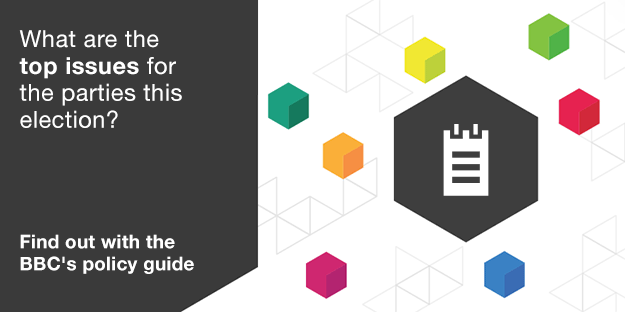SNP campaigning hard for big breakthrough
- Published
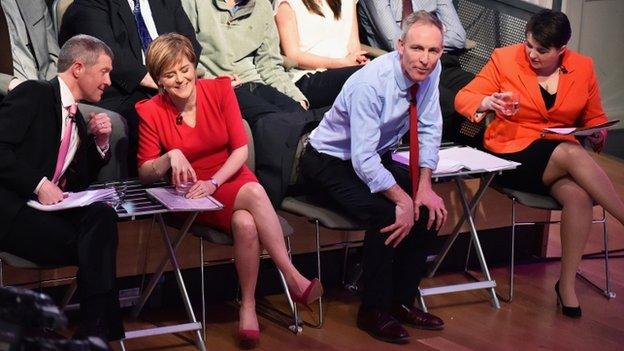
The Scots music group, consisting of ladies and gents of a certain maturity, are wrapped in big striped woolly jumpers or anoraks, as well they might for it is chilly at the open-air Balerno farmers' market.
They pluck and saw their instruments in the centre of a square of stalls selling chutneys and organic highland beef and the world's original tattie scone wrap.
This pretty village is part of the Edinburgh South West constituency, where some are predicting, external the SNP will come from fourth place to win.
The players are cheerful and enthusiastic about their music, less so about the election.
The general view was that the referendum was bad enough, but now the politicians are shouting at each other all over again.
Not everyone feels that of course. Many think the referendum was the most exciting, engaging public event in an age and breathed new life into democratic debate.
What is not in doubt is that that plebiscite is the vital background to this general election, north of the border.
Nor should anyone doubt that when Scotland votes on 7 May what happens here could determine who becomes prime minister and define British politics for years to come.
It is a paradoxical election - in general it is a close run thing, where the main parties are all but flatlining.
But many expect we will wake up on 8 May to one huge change - a SNP landslide that wipes out Labour in its heartlands.
Poll after poll (and, yes, they can be wrong and are only snapshots) suggests that.
It also seems a paradox that the SNP strength has grown out of weakness, the defeat of its cause in the referendum.
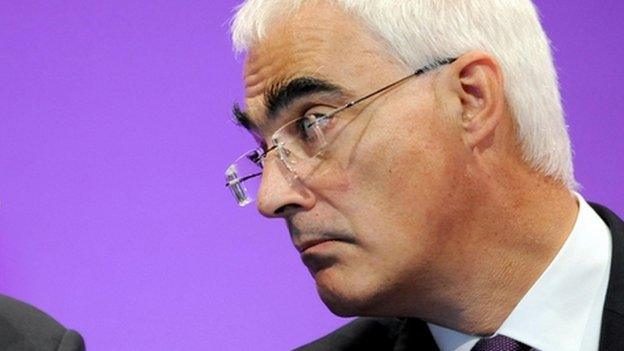
Alistair Darling was the local MP
Professor of politics at Strathclyde University John Curtice, the expert's expert on polling and Scottish politics, isn't surprised by the SNP's predicted surge across the country.
He says: "Essentially what the opinion polls are suggesting the SNP are going to get roughly the 45% that the 'Yes' side got in the referendum and indeed roughly the 45% the SNP got in the Scottish Parliament election of 2011.
"In other words, we talk quite loosely about there being an SNP surge in Scotland, this simply looks like the third occasion when the nationalists' forces are going to get around 45%."
What has changed of course is that now that could be translated into Westminster seats.
At the farmers' market it is striking how many are considering the SNP.
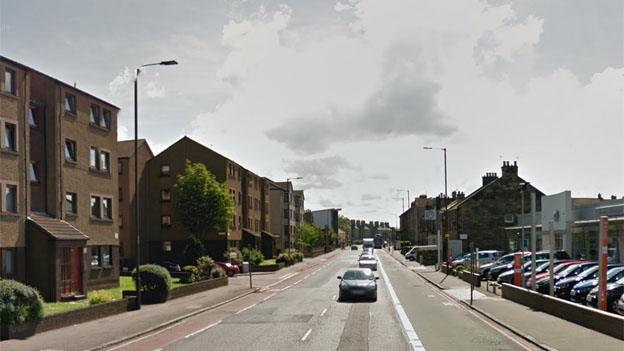
The working-class area of Gorgie will be a key battleground
This sprawling, pizza-slice shaped constituency runs from the lush Pentland Hills to the centre of Edinburgh, taking in suburban mansions and working-class tenements.
It was the seat of the former Labour Chancellor and leader of the Better Together campaign Alistair Darling, before that of the then Conservative Foreign Secretary Sir Malcolm Rifkind.
It is genteel old Edinburgh, a place with a history of industries that pre-date Scotland's mines and shipyards. The first pair of wellington boots were produced here, as well as the paper for the first Scottish bank note.
As the Spectator points out, external, in England it would be natural Conservative territory.
It voted "No" to independence. And yet the SNP hopes and expects to take the seat in May.
One man, browsing the stalls with his toddler in a push chair can't decide between the Conservatives and the SNP.
Alan, a volunteer digging away in the trim and attractive community garden, thinks the SNP has done a pretty good job in Scotland, but he is against independence so won't vote for them.
Gill, also helping out in her wellies, probably will go for the SNP - but maybe the Greens.
A man selling locally made jam for charity thinks many feel let down by the main parties, and so will give the SNP a go.
Key factors
Random vox pops are even further from a scientific survey than opinion polls, but I think these may reflect an important fact - across Scotland the SNP, which currently has only six MPs, may be taking most votes off Labour, currently the largest party with 40 MPs - but it appeals right across the spectrum.
For some of those who consider independence dangerous, the referendum has detoxified the SNP - more MPs may help the party achieve their long-term goal, but this time independence is not on the ballot paper.
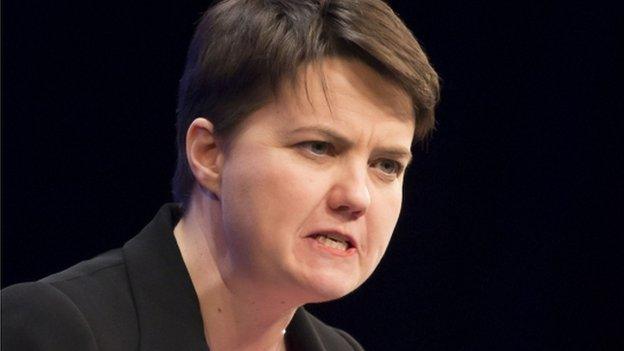
Ruth Davidson is defending her Westminster colleagues' record
Then, I keep hearing: "They put Scotland first."
There is a perception all the other parties have to make compromises with their colleagues in the rest of the UK, but the SNP is free of that constraint.
Conservative leader in Scotland Ruth Davidson answers: "I know that it has been quite a tough five years, and I know we have made some tough decisions, but we've got more people in work, and what the SNP is proposing £180bn worth more borrowing.
"What we are saying is, 'Let's finish the job we started.'"
The Greens' co-convener in Scotland, Patrick Harvie, says: "I think there are a lot of people who see some positive points from the SNP, but very often they don't go far enough.
"So for example people who want to protect the NHS know that it has to be protected from that EU-US trade deal and that threatens a whole host of other things as well and it needs to be killed off.
"The SNP's position is a good step but not far enough."
The third factor is a general feeling, of course disputed by other parties, that the SNP has done a reasonable job in government and is a serious, competent and professional party.
SNP well mobilised
They nationalists are out in force in Gorgie, a more working-class area, further in towards the city centre.
About 40 volunteers pose in front of a picture of the woman they hope will be their next MP.
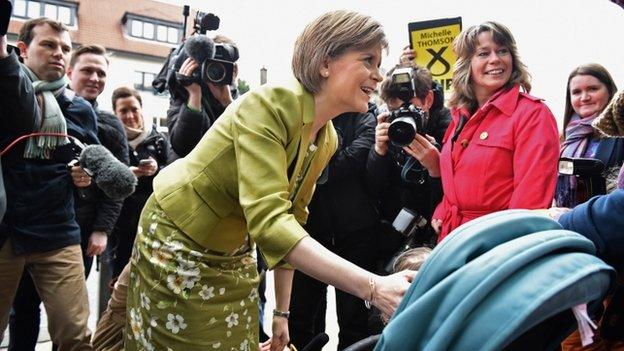
The SNP have run a high-profile campaign
The campaign manager, Sarah, tells the canvassers who should be in which tenant flat.
Much of the knocking is fruitless, and I'm puzzled why, when the "wrong" person answers there is no attempt to convert them.
The reply is quick - they aren't on the electoral register at that address so can't vote, and it's not that sort of canvass - not to change minds but to pin down where potential supporters are so they can be chased up on election day.
This is a highly professional ground game.
By contrast, the Labour activists, who tell me they have a stall in the farmers' market, have packed up because of the cold by the time we arrive at 11:00 BST and say they have nobody out in this large constituency in the afternoon.
It is not only in the special forces that the motto "He who dares, wins," is apt.
Privately the SNP is confident that if there is a hung Parliament, Labour will do a deal.
I put it to deputy leader Stuart Hosie MP that it has boxed itself into a corner by ruling out a coalition with the Tories and a confidence-and-supply agreement with a Labour Party that refuses to scrap Trident.
"If the SNP are in a pivotal position in a hung Parliament, Labour would be rather foolish if they didn't want to speak to us to try to get their policies through," he says.
"The Trident issue is particularly important if there is a confidence-and-supply agreement - let's wait and see how many anti-Trident Labour MPs down south get elected.
"The alternative to that is an incredibly arrogant position from [Labour leader] Ed Miliband, effectively, 'Take it or leave it.'"
Labour referendum legacy
You have to feel for Labour's new leader in Scotland, Jim Murphy.
He has got the drive and the strategy and the image that some south of the border lack, and he is pressing all the right buttons - but they needed to be pressed months or years ago.
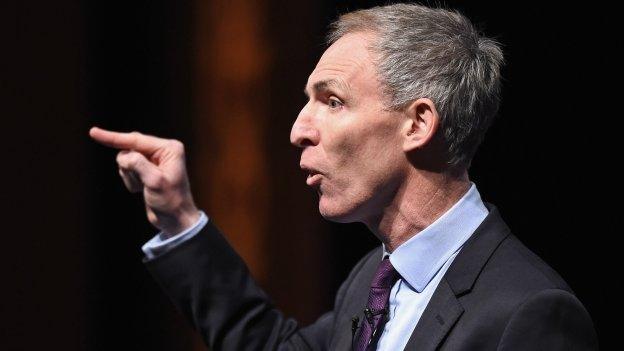
Jim Murphy hasn't had long as Labour leader
Here again the referendum looms - it was the more important fight and where Labour's energies were focused.
It also put Labour on the same side as the Conservatives, re-enforcing the feeling it isn't 100% "for Scotland".
Mr Murphy says: "If the SNP want to vote for Labour's manifesto, that is up to them. I am not going to ask, I'm not going to beg, and I am not going to seek permission to put Labour's manifesto to the House of Commons.
"It is just a fact that the SNP are ahead in the opinion polls in Scotland, and if theses polls are repeated on election night, it will be a bad night for the Scottish Labour party, it will be a good night for the SNP and it will be a fantastic night for [Tory leader] David Cameron - he can't beat Labour in Scotland, he needs someone else to do it for him.
"The SNP are at the moment fulfilling the role of David Cameron's little Scottish helpers."
The so far unstoppable rise of the SNP, if translated into seats in May, will pose huge questions for Labour if it forms a minority government.
There will be even bigger ones if it is part of the cause of its defeat.
A party that has pulled off the trick of being seen as UK insurgents when they are in fact also the Scottish government defies expectations, and may yet transform the politics of the UK.
